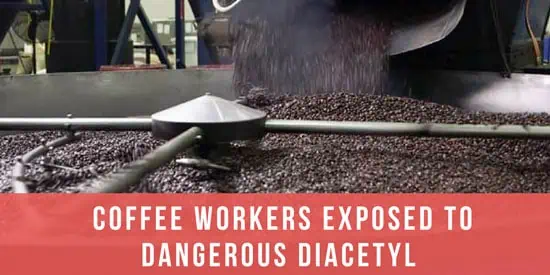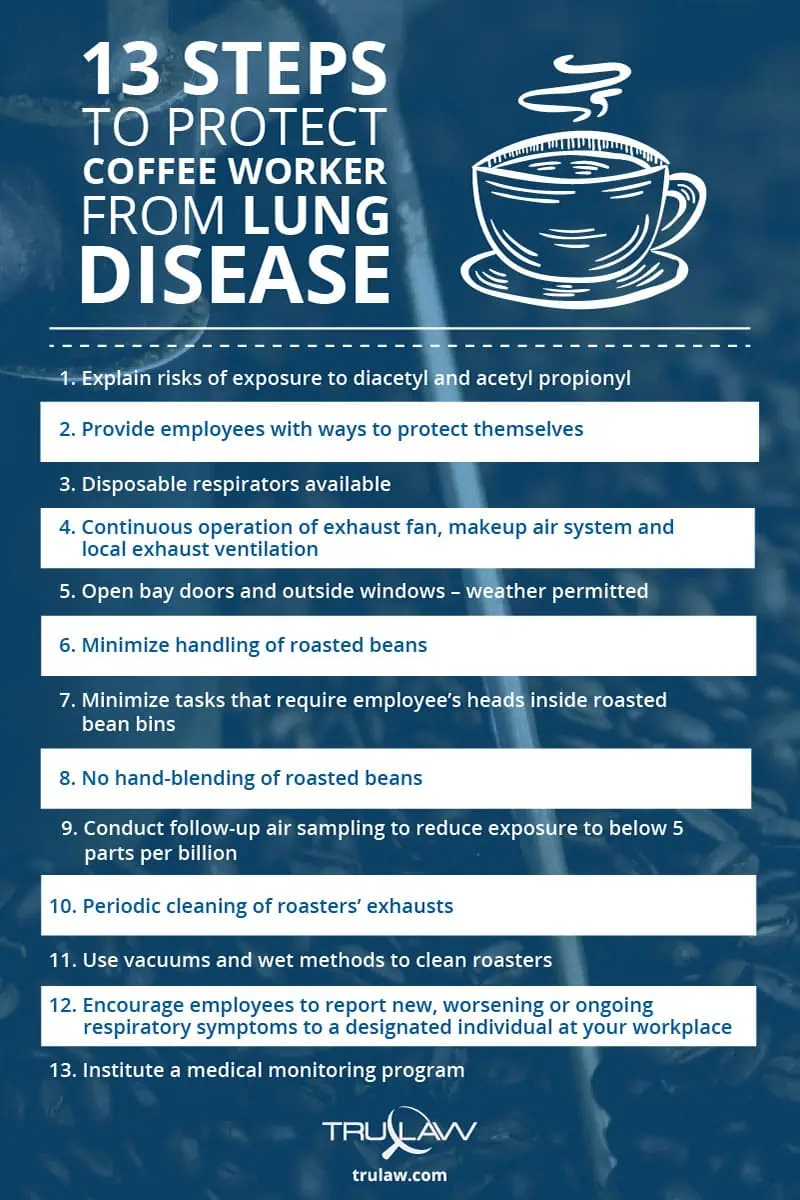Coffee Workers Exposed to Dangers of Diacetyl
- Last Updated: July 31st, 2023

Attorney Jessica Paluch-Hoerman, founder of TruLaw, has over 28 years of experience as a personal injury and mass tort attorney, and previously worked as an international tax attorney at Deloitte. Jessie collaborates with attorneys nationwide — enabling her to share reliable, up-to-date legal information with our readers.
Legally Reviewed
This article has been written and reviewed for legal accuracy and clarity by the team of writers and legal experts at TruLaw and is as accurate as possible. This content should not be taken as legal advice from an attorney. If you would like to learn more about our owner and experienced injury lawyer, Jessie Paluch, you can do so here.
Fact-Checked
TruLaw does everything possible to make sure the information in this article is up to date and accurate. If you need specific legal advice about your case, contact us by using the chat on the bottom of this page. This article should not be taken as advice from an attorney.
Coffee Workers Exposed to Dangers of Diacetyl
A new Center for Disease Control study uncovers the danger of exposure to diacetyl by various workers at coffee processing plants.
Studies reveal that diacetyl occurs naturally in coffee roasting even without flavoring and dangerous fumes from diacetyl coffee are released in greater quantities during the grinding process.

Diacetyl (2,3-butanedione) and acetyl prpionyl (2,3-pentanedione) have been blamed for hundreds of lung injuries and many deaths in the popcorn and flavoring industry.
Diacetyl and acetyl proprionyl are volatile organic compounds (VOCs) known as alpha-diketonoes that are added as ingredients in food flavorings and used in some food products such as microwave popcorn, bakery mixes, and flavored coffee.
It now appears that non-flavored coffee workers are at similar risk since diacetyl occurs naturally in coffee.
Table of Contents
Diacetyl Coffee
 The August 2017 Health Hazard Evaluation Report has been released, with recommendations on steps coffee roasting facilities can take to protect their workers.
The August 2017 Health Hazard Evaluation Report has been released, with recommendations on steps coffee roasting facilities can take to protect their workers.
In addition, a medical monitoring program should be established to protect employees who work in the production area.
Early identification of symptoms from inhalation of diacetyl is imperative in protecting workers.
Suspicions about work-related lung injuries occurring in the coffee industry are not new.
In 2013, the CDC identified workers in a coffee-processing facility in Texas who experienced progressive shortness of breath that was not properly diagnosed with a diagnosis of work-related obliterative bronchitis.
Early diagnosis with the flavoring-related lung disease at the Texas plant may have prevented others from getting sick and could have helped in the treatment of these two coffee workers.
The two cases of bronchiolitis obliterans identified in 2013 at the coffee-processing facility suggested the expansion of the number of workers potentially at risk for the flavoring-chemical related disease.
Health Hazards Of Exposure To Diacetyl
In November 2015, the National Institute for Occupational Safety and Health (NIOSH, which is the research arm of the CDC) followed the CDC identification of these two coffee-plant workers with an article and a dedicated website about the health hazards of exposure to diacetyl at a coffee processing plant.
In addition, NIOSH published standards and recommendations to prevent exposure at coffee processing plants and called for additional research into how coffee roasting, grinding, and storage could negatively affect the health of coffee production workers.
NIOSH followed their 2015 recommendations with further visits to coffee roasting plants in 2015 and 2016 as noted in the August 2017 Health Hazard Evaluation Report.
During visits to a Wisconsin coffee roasting facility at two separate times, researchers collected air samples and sampled coffee beans to measure the real-time air levels of diacetyl.
They also administered health questionnaires and performed breathing tests with several of the coffee-plant employees.
This further research found that coffee plant workers were four times more likely to report respiratory symptoms than the normal U.S. population.
Eye, nose, and sinus symptoms were the most commonly reported symptoms.
Wheezing was the most common lower respiratory symptom.

Managing Attorney & Owner
With over 25 years of legal experience, Jessica Paluch-Hoerman is an Illinois lawyer, a CPA, and a mother of three. She spent the first decade of her career working as an international tax attorney at Deloitte.
In 2009, Jessie co-founded her own law firm with her husband – which has scaled to over 30 employees since its conception.
In 2016, Jessie founded TruLaw, which allows her to collaborate with attorneys and legal experts across the United States on a daily basis. This hypervaluable network of experts is what enables her to share the most reliable, accurate, and up-to-date legal information with our readers!
Here, at TruLaw, we’re committed to helping victims get the justice they deserve.
Alongside our partner law firms, we have successfully collected over $3 Billion in verdicts and settlements on behalf of injured individuals.
Would you like our help?
At TruLaw, we fiercely combat corporations that endanger individuals’ well-being. If you’ve suffered injuries and believe these well-funded entities should be held accountable, we’re here for you.
With TruLaw, you gain access to successful and seasoned lawyers who maximize your chances of success. Our lawyers invest in you—they do not receive a dime until your lawsuit reaches a successful resolution!
AFFF Lawsuit claims are being filed against manufacturers of aqueous film-forming foam (AFFF), commonly used in firefighting.
Claims allege that companies such as 3M, DuPont, and Tyco Fire Products failed to adequately warn users about the potential dangers of AFFF exposure — including increased risks of various cancers and diseases.
Depo Provera Lawsuit claims are being filed by individuals who allege they developed meningioma (a type of brain tumor) after receiving Depo-Provera birth control injections.
A 2024 study found that women using Depo-Provera for at least 1 year are five times more likely to develop meningioma brain tumors compared to those not using the drug.
Suboxone Tooth Decay Lawsuit claims are being filed against Indivior, the manufacturer of Suboxone, a medication used to treat opioid addiction.
Claims allege that Indivior failed to adequately warn users about the potential dangers of severe tooth decay and dental injuries associated with Suboxone’s sublingual film version.
Social Media Harm Lawsuits are being filed against social media companies for allegedly causing mental health issues in children and teens.
Claims allege that companies like Meta, Google, ByteDance, and Snap designed addictive platforms that led to anxiety, depression, and other mental health issues without adequately warning users or parents.
Transvaginal Mesh Lawsuits are being filed against manufacturers of transvaginal mesh products used to treat pelvic organ prolapse (POP) and stress urinary incontinence (SUI).
Claims allege that companies like Ethicon, C.R. Bard, and Boston Scientific failed to adequately warn about potential dangers — including erosion, pain, and infection.
Bair Hugger Warming Blanket Lawsuits involve claims against 3M — alleging their surgical warming blankets caused severe infections and complications (particularly in hip and knee replacement surgeries).
Plaintiffs claim 3M failed to warn about potential risks — despite knowing about increased risk of deep joint infections since 2011.
Baby Formula NEC Lawsuit claims are being filed against manufacturers of cow’s milk-based baby formula products.
Claims allege that companies like Abbott Laboratories (Similac) and Mead Johnson & Company (Enfamil) failed to warn about the increased risk of necrotizing enterocolitis (NEC) in premature infants.
Here, at TruLaw, we’re committed to helping victims get the justice they deserve.
Alongside our partner law firms, we have successfully collected over $3 Billion in verdicts and settlements on behalf of injured individuals.
Would you like our help?








